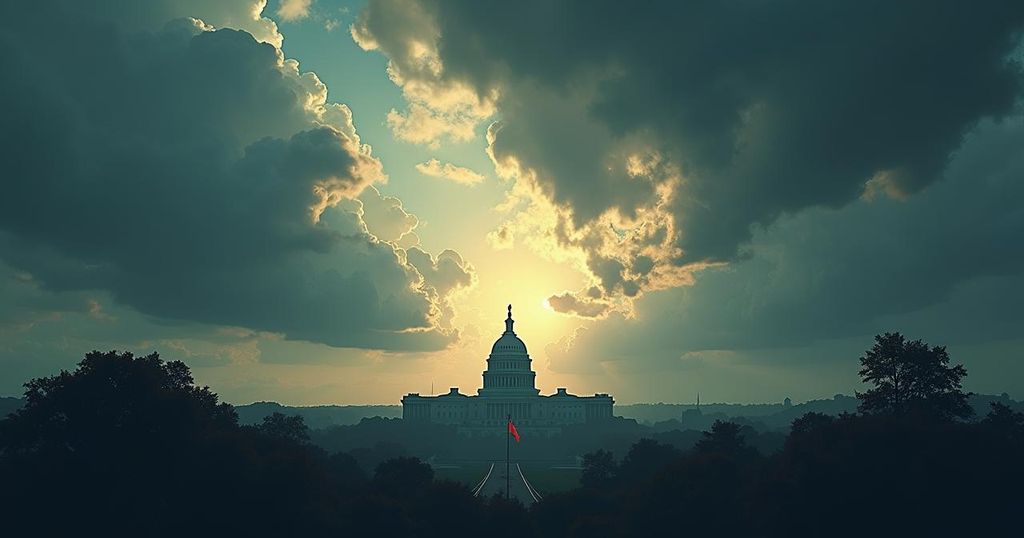Political Maneuvering Surrounding Hurricane Milton: An Analysis of Partisan Responses

The article examines the escalating political tensions preceding Hurricane Milton’s impact on Florida, highlighting the efforts of Vice President Kamala Harris to manage narratives amidst misinformation propagated by former President Trump. The storm presents significant challenges for both leaders as they navigate public perception and electoral stakes in light of climate-driven disasters, drawing comparisons to historical events and their political implications.
A contentious political discourse regarding Hurricane Milton commenced prior to the storm making landfall. As a potential natural disaster intensified, political opportunism seemed unavoidable, particularly in the final weeks of a presidential election featuring the indomitable Donald Trump. With the specter of climate-change driven disasters looming, the implications of the storm were substantial, often overshadowed by the parties’ grasp for political leverage. Traditionally, political ramifications of hurricanes manifest post-event, but in this instance, Trump’s push to exploit Hurricane Helene for personal political gain has instigated an early battleground. For Vice President Kamala Harris, Hurricane Milton serves as both a challenging opportunity and a perilous spotlight, posing a chance for her to demonstrate adeptness in managing public perception and delivering empathetic communication to victims. However, any perceived failures in federal response could jeopardize her standing ahead of the upcoming election, especially as Trump seeks to fabricate narratives attributing blame to her administration. Harris aimed to counteract Trump’s narrative by communicating to reporters that the former president was spreading disinformation regarding government assistance. “It’s about him, it’s not about you,” she stated, emphasizing the need to focus on crisis management rather than partisan disputes. On the same note, FEMA Administrator Deanne Criswell highlighted that Trump’s rhetoric was inducing fear regarding governmental support. President Biden responded to the impending crisis by canceling international engagements, underscoring the urgency of ensuring national safety amidst potential disaster. His leadership during such emergencies is crucial not only for public trust but also for his administration’s legacy, especially considering longstanding issues in his foreign policy. Trump has consistently demonstrated an eagerness to utilize crises for political advantage, leveraging Hurricane Helene to construct a narrative of incompetency against Harris and Biden. Allegations surfaced regarding the administration’s inability to offer adequate support, which Trump used to craft a disparaging portrayal, often devoid of factual basis, thereby utilizing the situation to strengthen his political positioning among skeptical voters. Meanwhile, the Harris campaign has countered these claims, underscoring Trump’s unreliable disaster management history. The legacies of past hurricanes, specifically the aftermath of Hurricane Katrina in 2005 and President Obama’s handling of Hurricane Sandy in 2012, continue to influence electoral dynamics. Florida Governor Ron DeSantis faces a similar conundrum—balancing state needs while maintaining political decorum with the Biden administration. As both Harrs and DeSantis engage in political maneuvering during the storm’s approach, their actions will undoubtedly shape their respective political futures. In conclusion, the intersection of natural disasters and political strategy continues to dominate American politics, particularly in light of Hurricane Milton. The response to the storm will not only impact local communities but also have significant implications for the election and the public image of the involved political figures. Understanding the dynamics at play will serve not only to inform constituents but also to hold leaders accountable during times of dire need. The political landscape around Hurricane Milton illustrates the delicate balance between governance and partisanship, an interplay that will undoubtedly resonate in the days and weeks following the storm.
The article discusses the political implications surrounding Hurricane Milton, a significant storm anticipated to impact Florida. It highlights the tensions between key political figures as they navigate the urgent responses needed during a natural disaster while simultaneously managing their political reputations and narratives in the context of an upcoming presidential election. The piece underscores the historical patterns of disaster management in political contexts, illustrating how past responses have shaped electoral outcomes.
In summary, the political backlash following Hurricane Milton underscores a persistent pattern where natural disasters become intertwined with electoral strategies. The behaviors and narratives crafted by leaders like Trump and Harris during such crises will not only influence immediate disaster relief but also affect their long-term political narratives and potential electoral outcomes. The event serves as a critical reminder of the need for ethical leadership and practical governance during times of crisis.
Original Source: www.cnn.com






